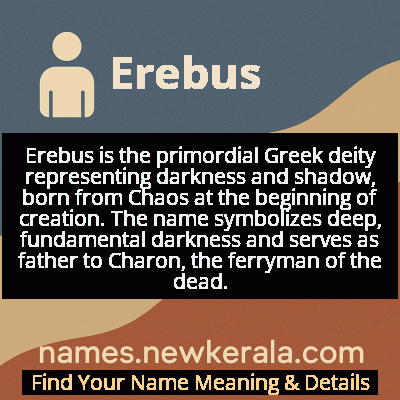Erebus Name Meaning & Details
Origin, Popularity, Numerology Analysis & Name Meaning of Erebus
Discover the origin, meaning, and cultural significance of the name EREBUS. Delve into its historical roots and explore the lasting impact it has had on communities and traditions.
Name
Erebus
Gender
Male
Origin
Greek
Lucky Number
7
Meaning of the Name - Erebus
Erebus is the primordial Greek deity representing darkness and shadow, born from Chaos at the beginning of creation. The name symbolizes deep, fundamental darkness and serves as father to Charon, the ferryman of the dead.
Erebus - Complete Numerology Analysis
Your Numerology Number
Based on Pythagorean Numerology System
Ruling Planet
Neptune (Ketu)
Positive Nature
Intuitive, analytical, spiritual, and inquisitive.
Negative Traits
Secretive, reserved, aloof, and can be overly critical.
Lucky Colours
Green, yellow.
Lucky Days
Monday.
Lucky Stones
Cat’s eye, moonstone.
Harmony Numbers
1, 5, 6.
Best Suited Professions
Scientists, researchers, spiritual leaders, detectives.
What People Like About You
Depth of knowledge, analytical skills, spirituality.
Famous People Named Erebus
Erebus (Mythological)
Primordial Deity
Personification of darkness and shadow in Greek mythology
Erebus (Literary Figure)
Mythological Entity
Fundamental cosmic being in classical Greek literature and cosmogony
Erebus (Scientific Namesake)
Geographical Feature
Namesake for various dark features in astronomy and geology
Name Variations & International Equivalents
Click on blue names to explore their detailed meanings. Gray names with will be available soon.
Cultural & Historical Significance
In addition to his cosmic significance, Erebus represents the darkness of the underworld—specifically the shadowy passage through which souls travel to reach Hades. This connection to death and transition gives him a profound psychological and spiritual dimension. Throughout Western literary tradition, references to Erebus have come to symbolize not just physical darkness, but moral and spiritual obscurity, the unknown, and the mysterious aspects of existence. His enduring presence in art, literature, and even modern scientific nomenclature (such as Mount Erebus in Antarctica) demonstrates the lasting power of this primordial figure in human imagination.
Extended Personality Analysis
Those named Erebus typically exhibit a deep, contemplative nature marked by intellectual curiosity and a comfort with complexity. They often possess an innate understanding of life's darker aspects and transitions, showing remarkable resilience in facing uncertainty or adversity. Like the primordial darkness they're named for, these individuals tend to be foundational in their relationships—providing stability and depth rather than superficial brightness. They're often perceived as mysterious or enigmatic, but this usually stems from their thoughtful, observant nature rather than intentional obscurity.
Their personality frequently includes a strong sense of boundaries and an appreciation for the spaces between things—whether literal thresholds or metaphorical transitions. They excel in situations requiring patience, depth of insight, and the ability to navigate ambiguity. While they may not be the most outwardly expressive individuals, their quiet strength and capacity for profound understanding make them valued companions and advisors. Their connection to the mythological Erebus suggests someone who embraces the full spectrum of human experience, including its shadowy aspects, and who finds meaning in exploring what others might avoid or fear.
Modern Usage & Popularity
Erebus remains an exceptionally rare given name in contemporary usage, primarily appealing to parents with strong interests in classical mythology, literature, or those seeking a name with profound historical and symbolic weight. Its usage is almost exclusively limited to English-speaking countries and represents a conscious choice rather than a popular trend. The name appears so infrequently in birth records that it doesn't register on most naming databases, typically being given to fewer than five children annually in the United States. Its modern appeal lies in its combination of ancient gravitas, distinctive phonetic quality, and the growing interest among some parents in mythological names that carry deep meaning rather than following fashion trends. Those who choose the name Erebus typically value uniqueness, historical significance, and the powerful symbolism of primordial darkness as a creative force.
Symbolic & Spiritual Meanings
Erebus symbolizes the primordial darkness that exists before creation—the fertile void from which all existence emerges and to which it may return. Metaphorically, it represents the unknown, the subconscious mind, transitional states, and the fundamental mysteries of existence. The name carries profound connotations of depth, potential, and the essential nature of reality that exists beneath surface appearances. It speaks to the concept that darkness is not merely the absence of light but possesses its own substantive qualities and creative potential. In psychological terms, Erebus represents the shadow self—those aspects of personality that remain unseen but fundamentally shape our identity and actions. The symbolism extends to ideas of transformation and rebirth, as darkness often serves as the necessary precondition for new beginnings and profound change.

